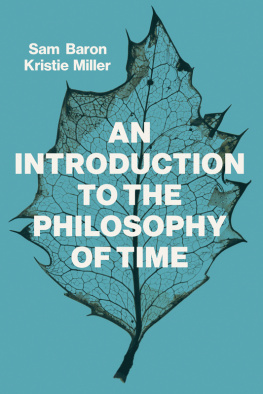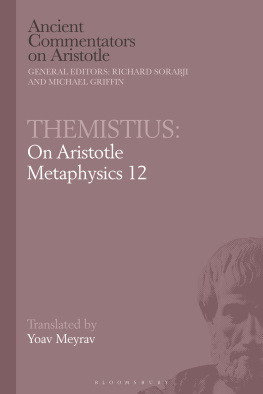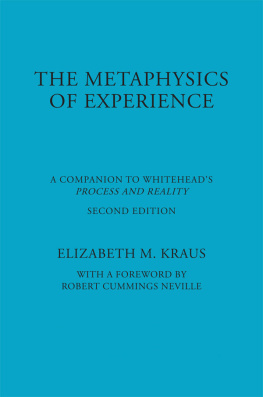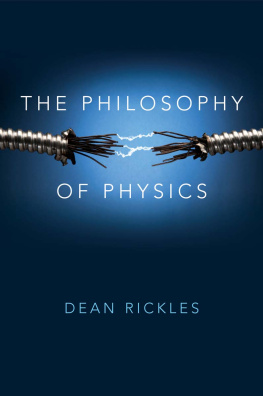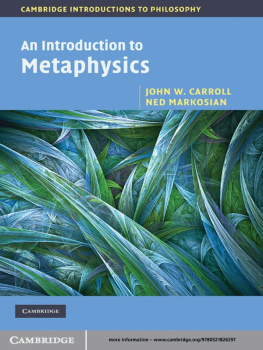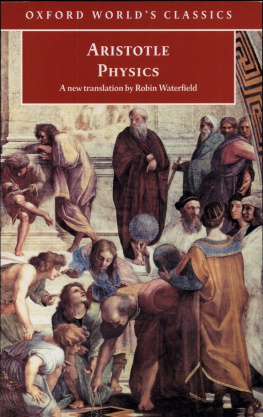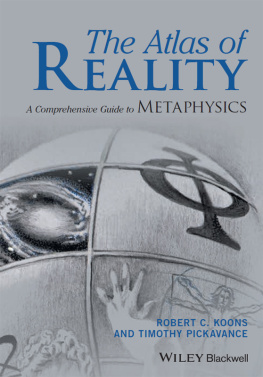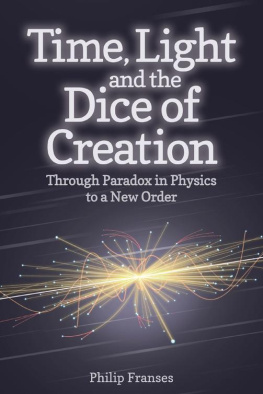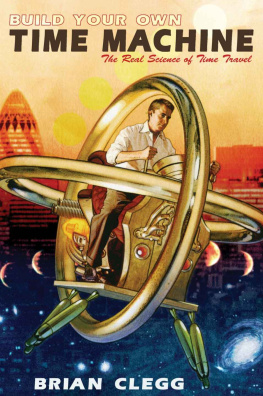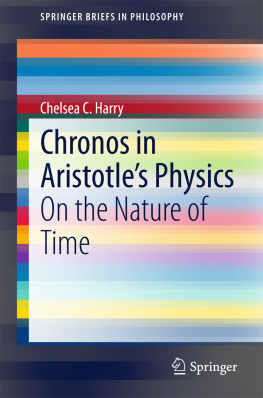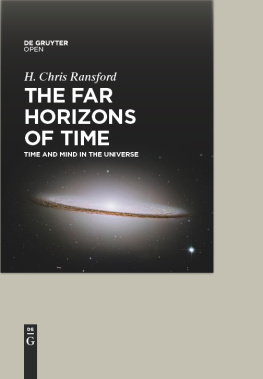
Copyright page
Copyright Sam Baron and Kristie Miller 2019
The right of Sam Baron and Kristie Miller to be identified as Authors of this Work has been asserted in accordance with the UK Copyright, Designs and Patents Act 1988.
First published in 2019 by Polity Press
Polity Press
65 Bridge Street
Cambridge CB2 1UR, UK
Polity Press
101 Station Landing
Suite 300
Medford, MA 02155, USA
All rights reserved. Except for the quotation of short passages for the purpose of criticism and review, no part of this publication may be reproduced, stored in a retrieval system or transmitted, in any form or by any means, electronic, mechanical, photocopying, recording or otherwise, without the prior permission of the publisher.
ISBN-13: 978-1-5095-2451-8
ISBN-13: 978-1-5095-2452-5(pb)
A catalogue record for this book is available from the British Library.
Library of Congress Cataloging-in-Publication Data
Names: Baron, Sam, author. | Miller, Kristie, author.
Title: An introduction to the philosophy of time / Sam Baron, Kristie Miller.
Description: Cambridge, UK ; Medford, MA : Polity Press, 2018. | Includes
bibliographical references and index.
Identifiers: LCCN 2018011849 (print) | LCCN 2018040377 (ebook) | ISBN
9781509524556 (Epub) | ISBN 9781509524518 (hardback) | ISBN 9781509524525 (pbk.)
Subjects: LCSH: Time.
Classification: LCC BD638 (ebook) | LCC BD638 .B3369 2018 (print) | DDC 115--dc23
LC record available at https://lccn.loc.gov/2018011849
Typeset in 11.25 on 13 pt Dante
by Fakenham Prepress Solutions, Fakenham, Norfolk NR21 8NL
Printed and bound in the UK by CPI Group (UK) Ltd, Croydon
The publisher has used its best endeavours to ensure that the URLs for external websites referred to in this book are correct and active at the time of going to press. However, the publisher has no responsibility for the websites and can make no guarantee that a site will remain live or that the content is or will remain appropriate.
Every effort has been made to trace all copyright holders, but if any have been inadvertently overlooked the publisher will be pleased to include any necessary credits in any subsequent reprint or edition.
For further information on Polity, visit our website: politybooks.com
Acknowledgements
Parts of this book have appeared elsewhere. Figures 19, 20 and 21 have previously appeared in S. Baron, Back to the Unchanging Past, Pacific Philosophical Quarterly 98 (2017): 12947. has appeared in an adumbrated form in S. Baron, Time, Physics and Philosophy: Its All Relative, Philosophy Compass 13 (2018). The authors are grateful to Pacific Philosophical Quarterly and Philosophy Compass for allowing the re-use of this material.
In addition, Kristie Miller would like to thank Annie and Freddie Braddon-Miller for their advice throughout this project. Sam Baron would also like to thank Sara Linton for her support and would like to note that Sara did not, in fact, kill her plants by failing to water them as of this book would seem to suggest. Sara is happy to report that her plants are alive and well.
List of Figures
Introduction
Time is woven into the fabric of our lives. Everything we do, we do in and across time. It is not just that our lives are stretched out in time, from the moment of birth to the moment of our death. It is that our lives are stories. We make sense of ourselves, today, by understanding who we were yesterday, and the day before, and the day before that; by understanding what we did and why we did it. Our memories shape our present selves, since we are the product of who we were, and who we remember being. Yet who we are lasts for but a moment. It is who we will be that demands attention. We are forever projecting ourselves into the future. We painstakingly plan for the needs of our future selves, all the while knowing that while what we do will make those future selves who they are, still, our future selves are elusive. So it is not simply that we happen to live our lives in time, the way, say, one might happen to live in Australia, or Singapore. It is hard to fathom how things could be otherwise. What would it be to live a life without time?
Yet time itself is intangible. Though we are keenly aware of what has been of pain and loss, regret and pride and of what might be of anticipation, and dread, and longing time itself seems unaffected by anything we do. Though we can anticipate a future birthday cake, time itself cannot be tasted. Though we can dread a future dentists appointment, time itself cannot be touched. Though we remember the crunching of leaves this past autumn, time itself cannot be heard. How can it be that something so central to each of us, to who we are, and what we care about, can be so spectral? What, in the end, is time? Is time real, like a substance in which each of us, like insects in amber, finds ourselves trapped? Is time a dimension through which we can move? Is time not a thing at all, but some connection between events? If time is real, what is it like? Does it flow like a river, taking each of us prisoner in its current, washing us ever closer to the end of our lives? Is time like a cresting wave, coming ever closer to each of us from the future, engulfing us, and then receding into the past? Or is time static? Like a one-way road that each of us might wander, with no chance to turn back? Or perhaps time is like none of these things. Perhaps time is more like space; something we can navigate freely, so that we can visit different times just like we visit different places. Perhaps we can travel in time the way we can travel in space.
These questions, and many more, are the focus of this book. Now, you might wonder what philosophers are doing writing a book about time. Surely thats a job for physicists! It is true: a great deal of what we know about time stems from our understanding of physics. However, even in physics we find that there are questions about time that go unanswered. Moreover, increasingly, physicists are turning to philosophers for help in understanding the role that time plays in current physical theories. Our goal is to get the reader up to speed on some of the central issues that influence our understanding of time so that they too may play a role in this ongoing discussion between science and philosophy. We hope that in doing so it will become clear what philosophy can bring to the study of time.
There is a natural narrative in philosophy regarding the study of time, and we have chosen to organise this book according to that narrative. However, the book may also be approached in a choose-your-own adventure spirit. While later chapters build on material introduced in earlier chapters, you can skip around, reading the book in any order you choose. For the instructor, this means that she can design her course around this book in any number of ways, depending on the particular topic she wishes to focus on.
introduces some key views in the philosophy of time and sets the stage for what is to come. It distinguishes dynamic from static theories of time, and provides a sense of why one might be tempted by one or other of these views. Then it outlines various kinds of static and dynamic theory.
introduces the idea of temporal flow. This is an elusive notion, and we spend some time trying to work out what temporal flow could be, and whether the notion makes any sense at all. We consider a number of ways of modelling temporal flow, as well as various objections to those models.
Next page
